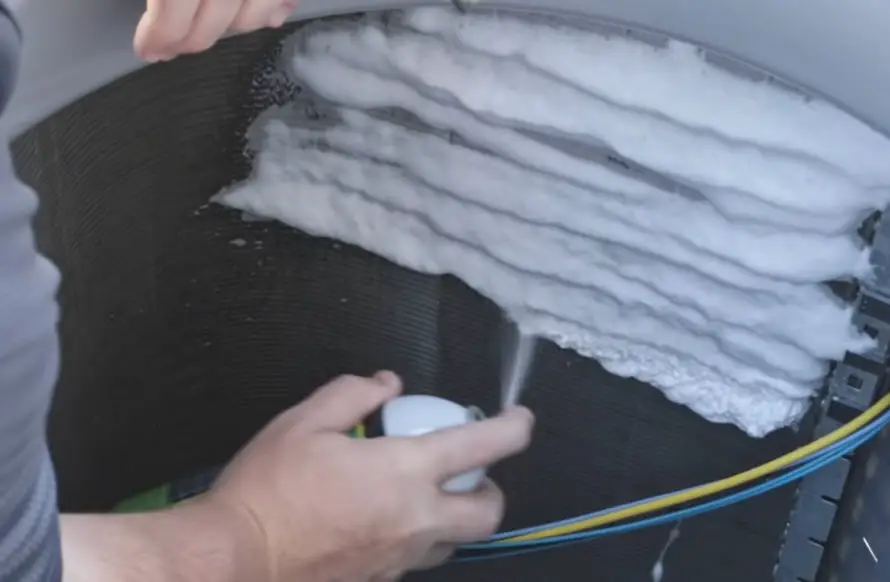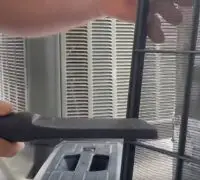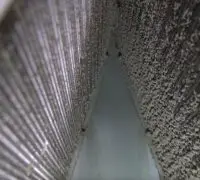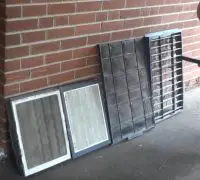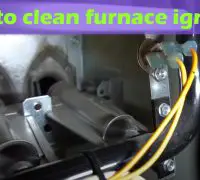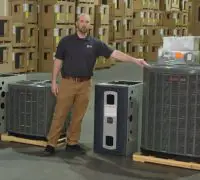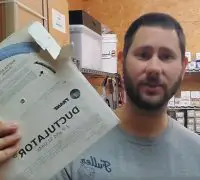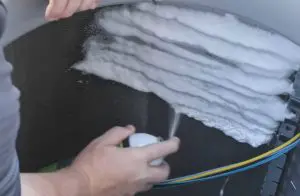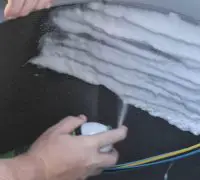Buying a reliable Trane air conditioner isn’t enough; you need to take good care of it for it to perform at its best for the longest time. The air conditioner has evaporator and condenser coils. Cleaning the coils helps the unit perform efficiently and improves your comfort inside.
Page Table of Contents
The Air conditioner’s coils—why are they important?
The AC coils are delicate parts of the air conditioner that can bend or break with little force. They’re not easy to access (especially the evaporator coil, which is placed inside the house). Many recommend hiring licensed HVAC professionals to reduce the risk of damaging the AC unit or injuries.
The air conditioner coils help the air conditioner cool your house when it’s hot outside. With a classic split-system HVAC device, there is one indoor and one outdoor unit, and each has one coil. Within the indoor unit, the evaporator coil absorbs the heat and humidity from the house. The outdoor unit includes a condenser coil that releases the humidity and heat outside so that it doesn’t stay inside the house or the air conditioner.
The two coils perform non-stop and they’re crucial to remove humidity and heat from your home; otherwise, the air will get warm and not cool. Since the coils are essential for the AC’s performance, cleaning them regularly is fundamental. AC coil maintenance is a job for licensed HVAC technicians, but cleaning the AC coils, it’s something that anyone can do, with attention to detail and using some tips.
What can happen if the coils get dirty?
Regular maintenance of the air conditioner should include AC coil maintenance to perform at its best. If the air conditioner coils are dirty (the condenser and the evaporator), the unit’s efficiency will decrease. The unit will run for more time to cool your house, which will increase the energy bill, force the AC unit and finally shorten its expected lifespan.
Dirt build-up on coils impedes the heat transfer and forces the compressor to work harder. The temperature and head pressure increase as high as 75% and the dehumidification process slows down. Dirty coils alter the air quality and even make the motor fail. Servicing dirty systems can cause misdiagnosis problems and useless or faulty repairs.
Let’s take a look at what can happen if you don’t stay on top with AC coil cleaning:
Low AC efficiency
The primary function of the air conditioner is to take in heat and humidity from your home and take it outside and eventually cool your home. The condenser coils are exposed to dust, debris, dirt, leaves, and particles from the insulating layer. They will all block the coils from the surrounding air to take longer and harder the cooling process. The house will stay at an unpleasant temperature for a long time.
Extensive repairs and even system replacement
If you postpone AC coil cleaning for too long, the unit might develop problems that could have been avoided with proper maintenance. If the problems are severe, you might have to replace the whole system. For instance, dirt and dust build-up on the evaporator coil makes the refrigerant running through the coil not to warm as expected. Therefore, the water vapor will freeze instead of turning into a liquid. The frosted over AC coil will no longer absorb heat accordingly and the unit will eventually break.
The compressor overheating and leaks in the coils also affect dirty coils.
High cooling spending
When the condenser and evaporator coils are dirty, the heat transfer process will go slower than it should. As a result, the air conditioner will need more time to cool your home. The longer the air conditioner runs, the higher the energy bill.
Here’s a video tutorial on how you can clean your AC’s coil yourself:
Is the condenser coil the only coil your Trane AC has ?
The AC unit has two kinds of coils: the evaporator and the condenser coil. They play an essential part in cooling the house and maintaining a comfortable temperature.
The evaporator coil
The evaporator coil will absorb heat and humidity from the house, take it to the other parts of the air conditioner, and remove it from your home. The evaporator coil is inside the house and it’s made of metal (copper or steel) to conduct heat efficiently.
The condenser coil
The condenser coil is on the other part of the heat exchange cycle. It releases the humidity and heat from the house outside. This way, it doesn’t remain in the air conditioner and your home. The condenser coil is exposed to the outside elements and air, dust, dirt, leaves, animal urine, animal fur, grass clippings, etc.
The condenser coil doesn’t impact the indoor air quality, but cleaning the condenser coil and the evaporator coil will improve the AC’s energy efficiency.
How often to clean the condenser coil on your AC?
Annual coil cleaning can reduce the risk of malfunctions, slow down the unit’s degradation process, and save energy. If the coils are new, plan a coil cleaning program and stick with it to prevent coil deterioration. A professional should service your AC every six months, but most HVAC systems will only require annual servicing. While the HVAC professional cleans the coils, he will also run coil troubleshooting to see if the coils cause any problems to the AC unit.
Here are the proper methods to clean the condenser coil on your AC unit:
Cleaning the AC coils with commercial cleaners
Commercial cleaners are safe to use with the condenser and the evaporator coil. You can find them in many forms: foaming solutions and self-rising formulas.
The HVAC technician will start the cleaning by turning the unit off. He will clean excess debris and spray the coil with the commercial cleaning solution. He will allow the solution to soak for several minutes and use some warm water to rinse it off.
Cleaning with compressed air
Many HVAC professionals only use compressed air to clean the condenser coil because it’s located outside the house. This method isn’t appropriate for the evaporator coil because all the dirt and debris will be blown inside the house.
The HVAC professional will turn the unit off and blow air through the coil in the opposite direction of the normal flow. This will clean the condenser coil with compressed air. Anything stuck or placed around the coil will get blown to the top and the HVAC technician will remove it from there. Cleaning with compressed air is best to clean coils with loose and oversized materials on the surface. It’s not the perfect method to remove small pieces and particles, especially if they’re stuck.
Cleaning the AC coils with detergent
Even if commercial cleaners are ideal for cleaning AC coils, most AC can be cleaned with old-fashioned warm water and dish detergent combination. The HVAC technician will use some warm water and low-acidity household dish detergent. He will turn the unit off and use a low-pressure sprayer to spray the mixture on the coils. If he uses high pressure, he will most likely damage the coils.
After the mixture soaks on the coils for some minutes, the technician will use some warm water to wash the coils.
What AC coil maintenance can you do ?
We recommend you schedule regular maintenance with a licensed HVAC technician to keep the AC coils clean and help the AC perform at its best. Some of the routine maintenance that you can perform without professional help is replacing the AC filter every three months. Replacing the AC filter will keep the unit and the AC coils free of dust, debris, and dirt.
Take a look at the condenser coil from time to time and remove debris and unwanted items from the unit. Anything that grows outside should be at least 2 ft away from the unit so that no plants and roots touch the condenser coil.
